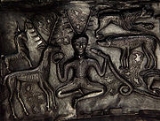AlbiorixToutorix
I am an American of strong Celtic and Teutonic descent, and have long been studying the histories and cultures of both peoples. Through the course of my studies, I have come to recognize numerous parallels and cultural links between these two great cultures which do not seem to get enough attention from mainstream archaeologists, anthropologists, sociologists, mythologists, and historians. For instance, let's start with the relationship between the Gaulish God Teutates, the Irish Tuatha de Danann, and the Teutones of Jutland(Denmark). All three share the same Celtic root--teuta--meaning literally "the people" or "tribe", and, interestingly enough, the Irish word "tuath" means north; therefore, does it not stand to reason that all three refer to a common Celtic or semi-Celtic culture hailing from the extreme northern-most regions of the Celtic frontiers, realms like Belgium, Holland, Denmark, and the Netherlands, lands where the distinctions between Celt and German were not so well defined? (Interestingly enough, the word "German" is thought to have come from the Celtic word "germanii", meaning "genuine"!) Other interesting parallels between the Norse and Celts include tribal names shared by the inhabitants of Gaul, Denmark, and the British Isles alike preceding the Roman conquest, such as the Anglii and Cimbri hailing from Jutland and the Deceangli and Cymru of Wales, or perhaps even a literal translation in the Classical Irish Book of Invasions describing successive waves of migrations by these northernmost Celtic tribes out of their homelands in Jutland and along the North and Baltic seacoasts westward towards the more favorable climates of Britain and Ireland. What's to say that the battle between the Fir Bolg and the Tuatha de Danann doesn't literally refer to a battle between the Belgae and the Danes? After all, "Fir Bolg" translates literally to "Men of Belgae", therefore, could "Tuatha de Danann" quite possibly have a literal translation of "(North)tribe or people of Danmhairg(Denmark)? Sure it's not exactly consistent with mainstream archaeology, but it is, at least, an alternative theory with enough legitimate linguistic evidence, at least, to strongly suggest that the Celts and Teutons were at one time culturally indistinct from one another, and only as recently as the Gallic Wars did they begin making definite cultural distinctions between their tribes and what was to be recognized as "Celtic" or "Germanic". Or I could just be another crazy, obsessed, ethnocentristic Celtophile. Food for thought, anyway. Hope you enjoyed reading a few moments inside my mind! Latha math an-Drasda!


